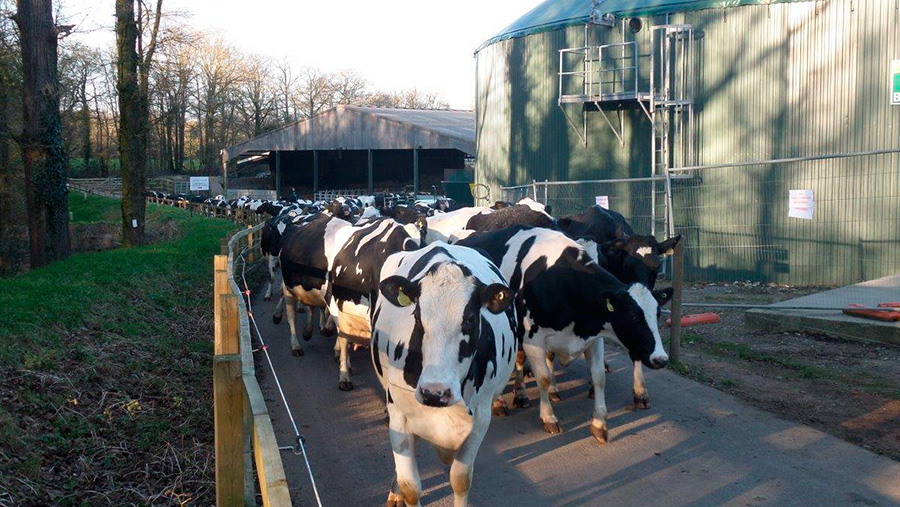Future of farm biogas plant in doubt after inspector ruling
 Crouchland Farm
Crouchland Farm The future of an industrial-scale biogas plant is in doubt after an independent planning inspector ruled that no feedstocks could be imported to feed the biogester.
In a ruling announced last week [PDF], planning inspector Katie Peerless ruled it is only lawful for Crouchland Biogas to source input materials from the 186ha farm itself to use in the digester.
“The importation of waste and any other materials for anaerobic digestion from land outside the boundaries of Crouchland Farm… and the council’s refusal to grant a certificate of lawful use… was well-founded and that the appeal should fail,” concluded the inspector.
See also: Dairy farm locked in battle over biogas expansion
This effectively means that Crouchland Biogas Farm, must only use its AD facility as originally intended – to help handle the dairy farm’s slurry and crops and not as a facility to import other farms’ waste, crops of food waste.
Appeal
Crouchland Biogas, in Kirdford, Billinghurst, West Sussex, had appealed to the inspector against a decision by West Sussex County Council to refuse a certificate of lawful use for the unrestricted throughput of imported waste or other material and the export of gas and digestate.
Sara Burrell, chairman of Plaistow and Ifold Parish Council, said the council was pleased with the independent inspector’s decision.
She added: “This decision supports what both the local parish councils and the local community have been saying all along.
“Crouchland Biogas only has permission for a small scale, ‘on-farm’, AD facility to process ‘on-farm’ slurry and waste.
“We now hope that those responsible for running Crouchland Biogas respect the decision of the independent planning inspector and stop the thousands of inappropriate HGVs from causing damage to our local environment and return the site to what was fully supported by the local community, a small scale AD facility for processing on farm slurry and waste.”
‘Unlimited imports’
In a statement, local campaign group Protect Our Rural Environment (Pore), said: “We feel that our main assertion that this was never permitted to be anything more than a small-scale plant ancillary to the farm has been upheld – and as such means that there is no lawful permission for unlimited imports by HGV.”
The certificate of lawfulness was seen as a crucial component in Crouchland’s attempt to overturn a West Sussex County Council’s decision to refuse retrospective planning permission for the expanded AD plant in March 2015. Crouchland’s appeal case is due to be heard in the autumn.
However, if Crouchland should seek to overturn the inspector’s decision, it would have to challenge the ruling in the High Court.
Crouchland began operating an on-farm AD unit to process its own waste from its dairy herd in 2009 to generate electricity to power the farm and export the surplus to National Grid, fully supported by the local community.
Planning permission
But since then, the company, Crouchland Biogas, has enlarged the site without required planning permission to an industrial-sized AD plant and has been exporting biomethane gas by tanker to enter the national gas grid, near Portsmouth.
Leon Mekitarian, Crouchland’s managing director, told Farmers Weekly, the farm sources feedstock from more than 20 local farms which “rely on our biogas plant”.
He said the operation provides renewable biogas to 3,850 homes and secures more than 20 local jobs.
Mr Mekitarian said: “We are pleased that the planning Inspector’s decision confirmed that the anaerobic digestion scheme ancillary to Crouchland Farm was lawful and extended the permitted lawful development certificate granted in October last year.
“This ruling gives us permission to continue to produce and export renewable energy for the benefit of the whole country, protecting the livelihoods of the people that work on our farm.
“We now have confirmation that we can lawfully operate an AD plant on the farm. This includes the collection, condition and export of biogas; the generation and export of electricity; and the production of digestate using waste generated from the plant and other materials produced on our Farm.
“It was disappointing that the inspector would not permit importing feedstock from land that Crouchland rent locally, or is grown for the farm by local farmers.
“AD is a flexible technology and one of its main advantages is that it can adapt easily to process a wide variety of feedstock. It is therefore important to stress that the baseline AD plant established as lawful by this decision, is no less viable as a result.”
Meanwhile, legal proceedings brought by the Environment Agency against Crouchland Farms over an alleged incident of pollution of the River Kird in December 2013 have been adjourned until 22 July at Worthing Magistrates’ Court.
